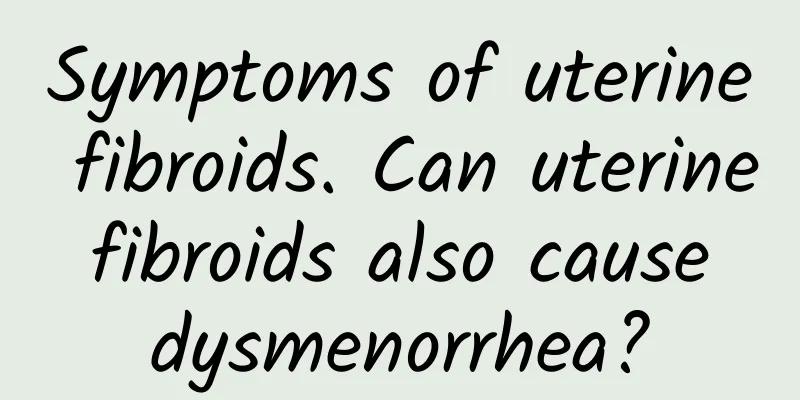Symptoms of uterine fibroids. Can uterine fibroids also cause dysmenorrhea?

|
It is still common for women to suffer from dysmenorrhea. Many women have terrible dysmenorrhea and are often seen rolling around in bed. Dysmenorrhea is usually a sign of unhealthy women. But do you think dysmenorrhea is related to uterine fibroids? Is dysmenorrhea a uterine fibroid? Experts will answer this for you. Is dysmenorrhea caused by uterine fibroids? Many women think that dysmenorrhea is caused by menstruation, and it will pass every time, no matter what disease occurs. They often maintain a good attitude. In fact, this idea is very irresponsible. Gynecologists point out that dysmenorrhea may be a warning sign of your health. If the cause is not found and treated in time, it may lead to serious diseases. Is dysmenorrhea caused by uterine fibroids? Experts warn that dysmenorrhea is likely to be caused by uterine fibroids. Uterine fibroids are a type of uterine tumor that suddenly grows in the uterine cavity. Because the endometrium covers the uterine cavity, it occupies the uterine cavity, affects the discharge of menstrual blood, and can cause abnormal uterine contraction, dysmenorrhea, and irregular menstrual volume and cycle. Is dysmenorrhea caused by uterine fibroids? In addition to uterine fibroids, dysmenorrhea may also occur due to endometriosis. The main manifestation is progressive dysmenorrhea. The pain is mainly located in the lower abdomen and lumbosacral region, and can be dispersed to the vagina, perineum, anus or thighs. It usually starts 1 to 2 days before menstruation, is most severe on the first day of menstruation, and gradually subsides after menstruation. Therefore, people with longer menstruation often have longer duration of pain, which is the most prominent in patients with endometriosis. The possibility of dysmenorrhea is greater, but the possibility of uterine fibroids is not ruled out, but the root cause of dysmenorrhea can only be found from the surface symptoms. Therefore, when uterine fibroids occur, we must go to the hospital for examination as soon as possible, and do not delay the treatment of uterine fibroids to avoid causing more harm. Uterine fibroids, symptoms, long menstrual periods are related to uterine fibroids, what are the symptoms of uterine fibroids, what are the symptoms of uterine fibroids? What are the symptoms of uterine fibroids during menstruation? Can uterine fibroids cause longer menstrual periods? So, next, let's understand the experts' introduction to the symptoms of uterine fibroids, I hope it can help you. The symptoms of the disease reflected by different patients with uterine fibroids, different types of uterine fibroids and patients of different age groups are also different. What are the menstrual symptoms of uterine fibroids? Once gynecological uterine fibroids are found, you should actively cooperate with the doctor for treatment. Only in this way can the disease be cured as soon as possible. For patients with uterine fibroids, there will certainly be some abnormalities during menstruation. First of all, we should know that the female uterus is divided into two parts, one is the uterus and the other is the cervix. In addition, more than 80% of women have uterine fibroids in the uterus, which often easily leads to menorrhagia. If the fibroids grow in the smooth muscle, there are no symptoms in the early stage, and early uterine fibroids may be asymptomatic because the uterus is a pelvic organ with some important organs such as the bladder in front. Many outpatients come and find uterine fibroids, and there is no performance, which also shows that once they want to choose a regular hospital for gynecological examination, there will be no misdiagnosis. Most fibroids come mainly from the uterus. To a certain extent, patients with symptoms will pay more attention to the disease. Therefore, the symptoms of uterine fibroids during menstruation are excessive menstruation and relatively long menstruation. Of course, many gynecological diseases can induce menstrual diseases, so changes in menstruation cannot be relied upon alone to indicate uterine fibroids. For patients with uterine fibroids, irregular changes in menstruation are only one symptom on the one hand, and there may also be a lump problem on the other hand. When the tumor is relatively small, it is difficult for me to feel it, but as the fibroids increase, the lump will become more and more obvious. In short, if there is any abnormality in the body, we should pay attention to it. Experts have comprehensively introduced the symptoms of uterine fibroids and menstruation. In order to better treat uterine fibroids, it is recommended that you undergo a comprehensive examination after you become ill, understand the causes and symptoms of uterine fibroids, and find out the cause to avoid misdiagnosis. |
<<: Symptoms of uterine fibroids Are there no symptoms of uterine fibroids?
>>: Symptoms of uterine fibroids Prevention measures of uterine fibroids
Recommend
What to do if you have cervicitis? 3 ways to cure cervicitis easily
Some people don't know what cervicitis is. Wh...
What are the causes of uterine fibroids?
Among the many gynecological diseases, uterine fi...
When is the ovulation period if the menstruation comes on the 30th?
A while ago, my best friend and I went to the hos...
Can I drink saffron water if I have uterine fibroids?
Usually, patients with uterine fibroids can drink...
Can I have an abortion at six months? When is the best time to have an abortion?
It is inevitable that men and women fall in love ...
Will ovarian cysts affect pregnancy?
Can I get pregnant if I have an ovarian cyst? Doe...
Three common manifestations of uterine fibroids What are the hazards of untimely treatment of uterine fibroids
Uterine fibroids (Hysteromyoma) Uterine leiomyoma...
What is subserosal uterine fibroids? What are the hazards of subserosal uterine fibroids?
I believe everyone knows about uterine fibroids, ...
Don’t indulge in weight loss during the New Year holiday! Eat breakfast to stabilize blood sugar and get rid of obesity
During the Spring Festival holiday, people’s appe...
Uterine cyst drug treatment
Uterine cysts can be relieved or eliminated throu...
What are the symptoms of Bartholinitis?
Bartholinitis is a common gynecological inflammat...
How much do you know about the precautions of vulvar leukoplakia
Do you know that there are precautions for vulvar...
How long does it take to discover an abnormality in an ectopic pregnancy?
How long does it take to find abnormalities in ec...
Ensuring that patients rest is an important consideration for chronic cervicitis
Due to the high incidence of chronic cervicitis, ...
What are the main types of ovarian cysts?
There are many types of ovarian cysts, so treatme...









